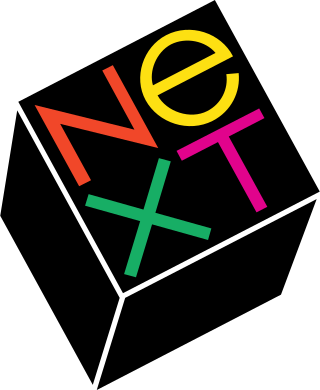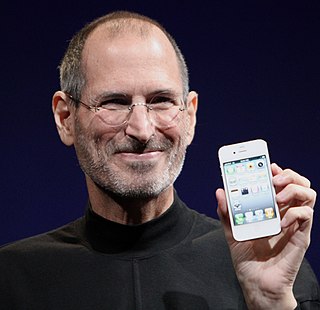Related Research Articles

NeXT, Inc. was an American technology company headquartered in Redwood City, California that specialized in computer workstations for higher education and business markets, and later developed web software. It was founded in 1985 by CEO Steve Jobs, the Apple Computer co-founder who had been forcibly removed from Apple that year. NeXT debuted with the NeXT Computer in 1988, and released the NeXTcube and smaller NeXTstation in 1990. The series had relatively limited sales, with only about 50,000 total units shipped. Nevertheless, the object-oriented programming and graphical user interface were highly influential trendsetters of computer innovation.
The history of macOS, Apple's current Mac operating system formerly named Mac OS X until 2011 and then OS X until 2016, began with the company's project to replace its "classic" Mac OS. That system, up to and including its final release Mac OS 9, was a direct descendant of the operating system Apple had used in its Mac computers since their introduction in 1984. However, the current macOS is a UNIX operating system built on technology that had been developed at NeXT from the 1980s until Apple purchased the company in early 1997.

"1984" is an American television commercial that introduced the Apple Macintosh personal computer. It was conceived by Steve Hayden, Brent Thomas, and Lee Clow at Chiat/Day, produced by New York production company Fairbanks Films, and directed by Ridley Scott. The ad was a reference to George Orwell's noted 1949 novel, Nineteen Eighty-Four, which described a dystopian future ruled by a televised "Big Brother". English athlete Anya Major performed as the unnamed heroine and David Graham as Big Brother. In the US, it first aired in 10 local outlets, including Twin Falls, Idaho, where Chiat/Day ran the ad on December 31, 1983, at the last possible break before midnight on KMVT, so that the advertisement qualified for the 1984 Clio Awards. Its second televised airing, and only US national airing, was on January 22, 1984, during a break in the third quarter of the telecast of Super Bowl XVIII by CBS.

The iMac G3, originally released as the iMac, is a series of Macintosh personal computers that Apple Computer sold from 1998 to 2003. The iMac was Apple's first major product release under CEO Steve Jobs following his return to the financially troubled company he co-founded. Jobs reorganized the company and simplified the product line. The iMac was designed as Apple's new consumer desktop product—an inexpensive, consumer-oriented computer that would easily connect to the Internet.

Rhapsody is an operating system that was developed by Apple Computer after its purchase of NeXT in the late 1990s. It is the fifth major release of the Mach-based operating system that was developed at NeXT in the late 1980s, previously called OPENSTEP and NEXTSTEP. Rhapsody was targeted to developers for a transition period between the Classic Mac OS and Mac OS X. Rhapsody represented a new and exploratory strategy for Apple, more than an operating system, and runs on x86-based PCs and on Power Macintosh.
Armas Clifford "Mike" Markkula Jr. is an American electrical engineer, businessman and investor. He was the original angel investor, first chairman, and second CEO for Apple Computer, Inc., providing critical early funding and managerial support. At the company's incorporation, Markkula owned 26% of Apple, equivalent to each of the shares owned by cofounders Steve Jobs and Steve Wozniak.

"Think different" is an advertising slogan used from 1997 to 2002 by Apple Computer, Inc., now named Apple Inc. The campaign was created by the Los Angeles office of advertising agency TBWA\Chiat\Day. The slogan has been widely taken as a response to the IBM slogan "Think". It was used in a television advertisement, several print advertisements, and several TV promos for Apple products.

The Mac transition to Intel processors was the process of switching the central processing units (CPUs) of Apple's line of Mac and Xserve computers from PowerPC processors over to Intel's x86-64 processors. The change was announced at the 2005 Worldwide Developers Conference (WWDC) by then-Apple CEO Steve Jobs, who said Apple would gradually stop using PowerPC microprocessors supplied by Freescale and IBM.
Apple used a variety of advertising campaigns to promote its iPod portable digital media player. The campaigns include television commercials, print ads, posters in public places, and wrap advertising campaigns. These advertising techniques are unified by a distinctive, consistent style that differs from Apple's other ads.
Ellen Mooney Hancock was a technology manager from the United States who worked for IBM and Apple, among others.

Apple Inc., originally Apple Computer, Inc., is a multinational corporation that creates and markets consumer electronics and attendant computer software, and is a digital distributor of media content. Apple's core product lines are the iPhone smartphone, iPad tablet computer, and the Mac personal computer. The company offers its products online and has a chain of retail stores known as Apple Stores. Founders Steve Jobs, Steve Wozniak, and Ronald Wayne created Apple Computer Co. on April 1, 1976, to market Wozniak's Apple I desktop computer, and Jobs and Wozniak incorporated the company on January 3, 1977, in Cupertino, California.
Joanna Karine Hoffman is a Polish-American marketing executive. She was one of the original members of both the Apple Macintosh team and the NeXT team.

Jonathan J. "Jon" Rubinstein is an American electrical engineer who played an instrumental role in the development of the iMac and iPod, the portable music and video device first sold by Apple Computer Inc. in 2001. He left his position as senior vice president of Apple's iPod division on April 14, 2006.
Regis McKenna was an American marketer in Silicon Valley and introduced some techniques today commonplace among advertisers. He and his firm helped market the first microprocessor, Apple's first personal computer, the first recombinant DNA genetically engineered product, and the first retail computer store.

Steven Paul Jobs was an American businessman, inventor, and investor best known for co-founding the technology company Apple Inc. Jobs was also the founder of NeXT and chairman and majority shareholder of Pixar. He was a pioneer of the personal computer revolution of the 1970s and 1980s, along with his early business partner and fellow Apple co-founder Steve Wozniak.
Steve Hayden is an American advertising executive. He is the Vice Chairman and Chief Creative Officer of Ogilvy Worldwide. Hayden is one of the most important figures of the late twentieth century advertising, leading creative teams at both Chiat/Day and BBDO on the Apple Inc.'s Computer account.

Mac is a family of personal computers designed and marketed by Apple since 1984. The name is short for Macintosh, a reference to a type of apple called McIntosh. The current product lineup includes the MacBook Air and MacBook Pro laptops, and the iMac, Mac Mini, Mac Studio, and Mac Pro desktops. Macs are sold with Apple's proprietary macOS operating system, which is not licensed to other manufacturers and exclusively bundled with Mac computers.

Steve Jobs is a 2015 biographical drama film directed by Danny Boyle and written by Aaron Sorkin. A British-American co-production, it was adapted from the 2011 biography by Walter Isaacson and interviews conducted by Sorkin. The film covers fourteen years in the life of Apple Inc. co-founder Steve Jobs, specifically ahead of three press conferences he gave during that time - the formal unveiling of the Macintosh 128K on January 24, 1984, the unveiling of the NeXT Computer on October 12, 1988, and the unveiling of the iMac G3 on May 6, 1998. Jobs is portrayed by Michael Fassbender, with Kate Winslet as Joanna Hoffman, Seth Rogen as Steve Wozniak, and Jeff Daniels as John Sculley in supporting roles.

Canon Computer Systems, Inc. (CCSI), sometimes shortened to Canon Computer, was an American subsidiary of Canon Inc. formed in 1992 to develop and market the parent company's personal computers and workstations. The subsidiary also assumed the responsibility of marketing Canon's printers and photocopiers, which were formerly sold by other Canon divisions. It went defunct in January 2001.

Big Mac is a cancelled workstation designed by Hartmut Esslinger for Apple Computer using the Snow White design language. Its consumer equivalent was Baby Mac. Development on Big Mac and Baby Mac began in 1984 and stopped after Steve Jobs left the company due to a clash of ideologies with John Sculley. Without the knowledge of Jobs, a project codenamed "Milwaukee" was in development concurrently with the Big Mac and ultimately succeeded it to become the Macintosh II, causing designer Rich Page to leave Apple for NeXT. Esslinger described Baby Mac as his "best design never to be produced", while Jean-Louis Gassée considered it to be a toy.
References
- ↑ Foltz, Kim (March 12, 1991). "Ammirati Drops Next Inc., Fearing Conflict With Nikon". The New York Times. Retrieved August 29, 2020.
- ↑ Isaacson, Walter (October 24, 2011). Steve Jobs. Simon & Schuster. p. 329. ISBN 9781451648539 . Retrieved September 16, 2020.
- ↑ Isaacson, Walter (October 24, 2011). Steve Jobs. Simon & Schuster. p. 351. ISBN 9781451648539 . Retrieved September 16, 2020.
- ↑ Chen, Brian (July 6, 2012). "One on One: Ken Segall, the Man Who Put the 'i' in iMac". New York Times. Retrieved August 29, 2020.
- ↑ Kahney, Leander (October 28, 2014). Jony Ive: The Genius Behind Apple's Greatest Products. Portfolio. pp. 128–129. ISBN 9781591847069 . Retrieved September 16, 2020.
- ↑ "Messner Vetere hires Segall". Campaign. November 14, 2000. Retrieved September 16, 2020.
- ↑ Shah, Aarti (June 10, 2008). "WPP names its Dell-anchored marketing firm Enfatico". PRWeek. Retrieved August 29, 2020.
- ↑ Segall, Ken (June 1, 2016). "About The Author - Ken Segall". PenguinRandomHouse. Retrieved August 29, 2020.
- ↑ "Best Sellers E-Book Non-Fiction". New York Times. May 13, 2012. Retrieved August 29, 2020.